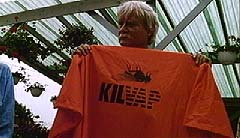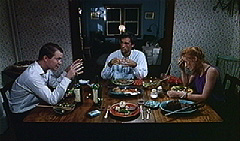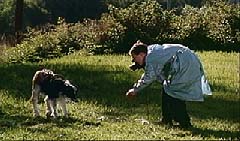No Telling / notes
NO TELLING | cast | crew | notes | press | photos | horror | animal rights | LOW IMPACT Filmmaking

HISTORY
Finished in Fall of 1992, NO TELLING played at the Boston Film Festival and the Long Island Film Festival (winner, best first feature) and abroad in the Montreal World Film Festival and The Avoriaz Festival of Fantasy and Horror Films. It is distributed internationally as THE FRANKENSTEIN COMPLEX (Largo Entertainment). Since its U.S. festival run, Fessenden cut 20 minutes out of the film. It played recently at the 1996 Long Island Film Festival, and IndieQueens Showcase in Queens. It is due out in video in the Fall of 1997.
FROM THE DIRECTOR (April 1992)
"Certain stories in the horror and science fiction tradition hold a 'Don't mess with mother nature' message underneath. We wanted to work with a classic horror story structure--the remote farm, the maverick research scientist, the wife who uncovers the secrets of the lab, and the greater issue of what happens when man 'plays God'-- to explore certain contemporary assumptions about scientific progress.

We stray from the genre by having Geoffrey do nothing that is illegal, or necessarily immoral. His wife is aware and supportive of his work, in the way that all of us, being the lay-public, are aware of the basic methods of science and assume that the goal of science is to better mankind. Only when Lillian feels personally rejected by Geoffrey does she begin to question his work. Only when illness strikes the farmer in the film does he veer from chemical farming. Only when we are touched personally by environmental calamity does environmentalism become an issue to us. The horror then, is when the acceptable and the every-day turn against us. When what we have supported and believed in becomes abhorrent to us.
No Telling is a portrait of the scientific process, which like any other human endeavor, is clouded by competitiveness, ambition, eagerness and waste. But the same blundering trial and error rhythms that lead to discovery in other creative fields--like the arts for example--are performed by the vivisector on live animals, and this is a compelling moral problem. Still, most of us feel unqualified to comment on scientific issues. The essentially powerless position that the public places itself in on matters of science relates to the inability of the animal who is being experimented on to protest. We are all willing guinea pigs.

I've been influenced most by the movies of the '70s where happy endings were not a given. With No Telling, I wanted to celebrate certain truisms of genre clichés without having to follow them to their predictable end. The lack of any genre pay-off focuses the viewer's attention back to the issues of the film. The climax of the story challenges audiences to confront their own complacencies, both in relationships, and in the broader questions of ethics and responsibility in scientific exploration.
No Telling is not science fiction. The research in Geoffrey's lab is based on documented experiments. His quest for a method to suppress the immune system and allow the transplanting of limbs and organs is a common goal among transplant researchers. We chose these experiments because they are basically sanctioned by the public. The scientist in our Frankenstien is not evil: he is doing the public's bidding, finding remedies for society's ills. I wanted the absence of a real villain to make the film more disturbing, because it points the finger right back at us, the audience."
NO TELLING | cast | crew | notes | press | photos | horror | animal rights | LOW IMPACT Filmmaking